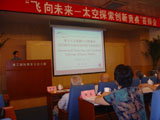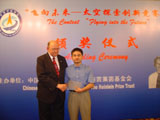 |
CUHK Researcher Came Third in Nationwide Astronautic Innovation Competition |
 |
|
|
Dr. Yang Yubin, postdoctoral research fellow of the Joint Laboratory for Geoinformation Science, won third prize at the nationwide Astronautic Innovation Competition 'Flying into the Future'. The only entry from Hong Kong and Macau that made it into the finals, Dr. Yang's project was only ranked after Nanjing University of Aeronautics and Astronautics and the University of Science and Technology of China.
Coorganized by the Chinese Society of Astronautics and the Heinlein Prize Trust, USA, the contest aimed at promoting astronautic innovation among young scientists and students. The adjudication panel was formed by 20 eminent experts in astronautic science, including chairman Mr. Zhuang Fenggan, academician of the Chinese Academy of Sciences (CAS), and vice-chairmen Mr. Liang Sili, CAS academician, and Mr. Cui Guoliang, academician of the Chinese Academy of Engineering. Dr. Yang's prize-winning project 'Software for Automatic Detection and Tracking of Space Debris Based on Astronomical CCD Image Sequences' was selected from 124 projects for the finals held in Beijing in mid-July. Each finalist had to convince the judges of the scientific strengths and economic value of his project during a 20-minute oral presentation and a 15-minute Q&A session. Dr. Yang's outstanding performance won him the third prize—the highest honour for projects from Hong Kong and Macau in this contest. Orbital space debris causes severe malfunction and even explosions of spacecrafts. Dr. Yang's research offers an efficient and low-cost solution to detect and track orbital space debris that is potentially dangerous and harmful to man's space exploration activities by using CCD image sequences recorded with optical astronomical telescopes during observation processes. The method can not only calculate more accurate positional information about space debris, but also enables high precision in space debris detecting and tracking processes. It is a convenient and precise way to obtain actual coordinates and trajectories of space debris for astronomical professionals. It enables space debris to be searched, tracked and monitored accurately and effectively, thereby forecasting and avoiding potential impact. Dr. Yang values the experience offered by the competition. 'It was truly my honour to represent CUHK in this competition. The result would not have been possible without the strong support of the University and the Stanley Ho Astronautics Training Foundation.'
Back to This Issue
|


|
|
|
|
|